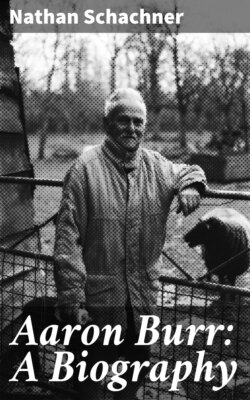Читать книгу Aaron Burr: A Biography - Nathan Schachner - Страница 16
На сайте Литреса книга снята с продажи.
4. Graduation
ОглавлениеTable of Contents
He graduated from Princeton in September, 1772. His record was good but not outstanding. Another of those nameless legends has it that he graduated at the head of his class with a rating that has never been surpassed in the history of the university. There is not the slightest basis for this. As a matter of fact, while his exact standing is not known, he ranked neither first, second nor third in the class. He did not deliver the Latin Salutatory nor the Valedictory. Much is made of his honorary oration, entitled, ironically enough in view of certain phases of his later career, “Castle Building.” But in those days of small graduating classes practically every graduate orated on Commencement Day.[50]
William Patterson, writing to their mutual friend, the Reverend Dr. Samuel Spring, already graduated and in orders, remarked that “the young gentlemen went through their exercises in a manner passable enough. The speakers were all tolerable—none of them very bad nor very good. Our young friend Burr made a gracefull appearance; he was excelled by none, except perhaps by Bradford.”[51] Burr never was to blossom into the orotund type of oratory to which Commencement orations are peculiarly adapted. His talents lay in the direction of precision, cogency, and the swift marshaling of facts.
Patterson, as a matter of fact, had already advised young Burr on the subject. Said he: “Forbear with me while I say that you cannot speak too slow. Your good judgment generally leads you to lay emphasis on the most forcible word in the sentence; so far you act very right. But the misfortune is, that you lay too great stress upon the emphatical word. Every word should be distinctly pronounced; one should not be so highly sounded as to drown another.”[52]
It was over; the tumult and the shouting and the fervent good-byes. He was sixteen, precocious, young, small even for his age, a graceful, handsome lad, who already had attached male friends to himself and was beginning to flutter the feminine dovecotes. The world was before him.
But his guardian’s good sense and his own desires declared in favor of delaying the plunge. Accordingly, Burr remained at Princeton after graduation for some months, reading extensively, laying the foundation for that love of books and searching inquiry that were to distinguish him throughout life, and withal amusing himself in a fashion not incongruous with his age, his looks and general disposition. He alternated between Princeton and Elizabethtown, where young Matthias Ogden, his best friend, joined him in boating, sailing the Kill van Kull, and in certain other adventures of which friend Patterson, more staid and accustomed to the cloistered air of Princeton, hinted in oblique phrases. “Our mutual friend, Stewart,” he chides, “informed me you were still at Elizabethtown. You are much fonder of that place than I am, otherwise you would hardly be prevailed upon to make so long a stay. But, perhaps, the reason that I fear it, makes you like it. There is certainly something amorous in its very air.”[53]
